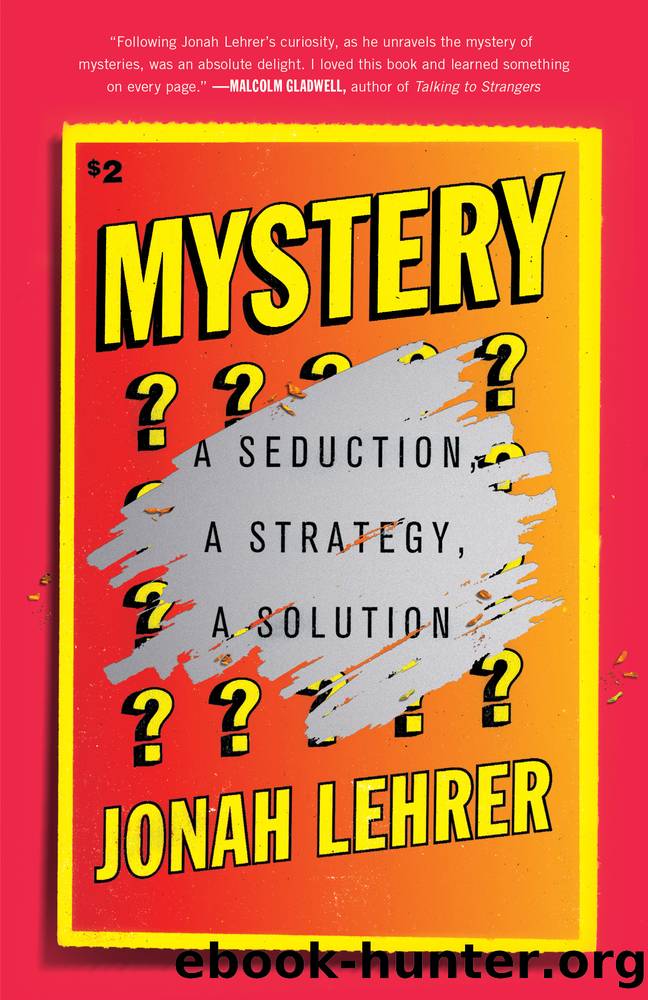Mystery: A Seduction, a Strategy, a Solution by Jonah Lehrer

Author:Jonah Lehrer [Lehrer, Jonah]
Language: eng
Format: epub
Tags: Psychology, Emotions, Social Science, popular culture, Social Psychology
ISBN: 9781501195891
Google: 2M8DEAAAQBAJ
Publisher: Simon and Schuster
Published: 2021-08-17T23:49:09.491811+00:00
The Mystery of Desire
In 1912, Sigmund Freud wrote an obscure paper about sexual impotence. He wrote about impotence because it was an extremely common affliction: âapart from anxiety in all its many forms,â it was the condition that he was most frequently asked to treat.33 For these patients, the sex organs refused to perform under certain conditions, even though there was nothing wrong with their physical function. The failure was in the mind.
Freud referred to this as âpsychical impotence.â While entire sections of his paper now feel outdated and obsoleteâFreud spends a lot of time worrying about the incestuous fixations of the unconsciousâthe medical issue he identified is still extremely prevalent.34 According to the Massachusetts Male Aging Study, 52 percent of men between the ages of 40 and 70 suffer from episodes of impotence.35 Even young men are not immune: according to a study of more than 9,000 Swiss men between the ages of 18 and 25, 30 percent have experienced at least one episode of impotence.36
What accounts for this epidemic of impotence? Freudâs greatest insight occurred as he considered less severe cases, those patients still capable of performing the physical act but incapable of enjoying it. According to Freud, their lack of pleasure wasnât due to a lack of love; these people were often deeply attached to their partners. They just didnât want to have sex with them. âWhere they love they do not desire, and where they desire they cannot love,â he wrote.
For Freud, psychical impotence revealed the tragic conflict at the center of adult relationships. We crave the adventure of romance, the kind of intense desire that accompanies flirting and courtship. Itâs a desire rooted in mysteryâwe are still learning about our partner, discovering her pleasures, mapping his moods. All those secrets make for good sex.
If we are lucky, however, this initial uncertainty will eventually give way to the security of attachment. Weâll come to rely on the relationship, finding safety in the predictable comforts of flannel pajamas and Netflix on the couch. Such are the unintended consequences of intimacyâit often leads to unromantic habits, fixed routines that remove the risk from a relationship. Before long, we stop closing the bathroom door.
Freud believed that the conflict between love and desire was an inescapable fact of life.IV Lasting passion was impossible. Marriage meant a renouncement of romance. Our best hope was to avoid neuroses and divorce.
In recent years, however, many psychoanalysts and psychologists have come to believe that Freud was too pessimistic. Theyâve discovered that many couples experience lasting sexual attraction, even though theyâve had sex thousands of times.37 In a sense, these relationships violate the law of habituation, which holds that repetition ruins pleasure, and that our nerves get bored by the familiar.
How do these couples do it? When the psychoanalyst Stephen Mitchell revisited Freudâs essay on impotence, he began with the observation that sexual experience is inherently private, the most opaque pleasure of all. âAlthough it is one of our most common experiences, none of us knows quite what sex is like for anyone else,â Mitchell writes.
Download
This site does not store any files on its server. We only index and link to content provided by other sites. Please contact the content providers to delete copyright contents if any and email us, we'll remove relevant links or contents immediately.
Kathy Andrews Collection by Kathy Andrews(11832)
The remains of the day by Kazuo Ishiguro(8999)
Spare by Prince Harry The Duke of Sussex(5197)
Paper Towns by Green John(5191)
The Body: A Guide for Occupants by Bill Bryson(5097)
Industrial Automation from Scratch: A hands-on guide to using sensors, actuators, PLCs, HMIs, and SCADA to automate industrial processes by Olushola Akande(5061)
Machine Learning at Scale with H2O by Gregory Keys | David Whiting(4313)
Be in a Treehouse by Pete Nelson(4051)
Never by Ken Follett(3957)
Harry Potter and the Goblet Of Fire by J.K. Rowling(3857)
Goodbye Paradise(3810)
The Remains of the Day by Kazuo Ishiguro(3413)
Into Thin Air by Jon Krakauer(3399)
Fairy Tale by Stephen King(3399)
The Cellar by Natasha Preston(3344)
The Genius of Japanese Carpentry by Azby Brown(3309)
120 Days of Sodom by Marquis de Sade(3275)
Reminders of Him: A Novel by Colleen Hoover(3121)
Drawing Shortcuts: Developing Quick Drawing Skills Using Today's Technology by Leggitt Jim(3081)
